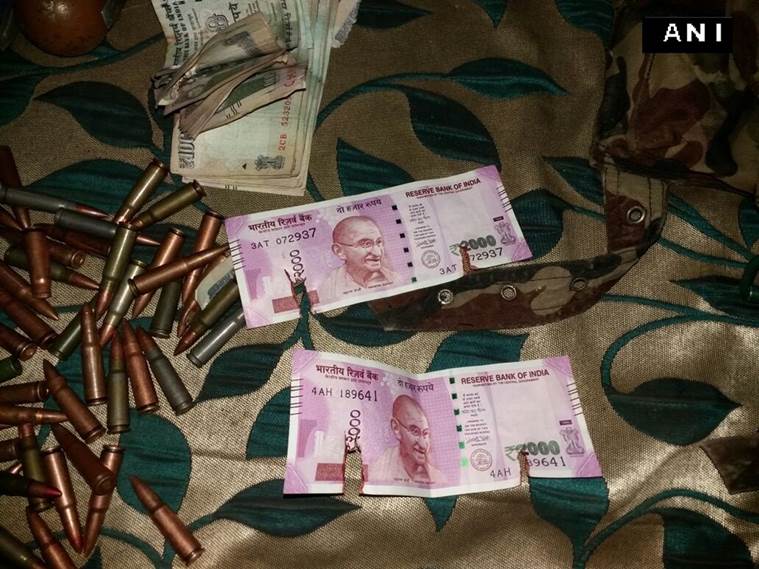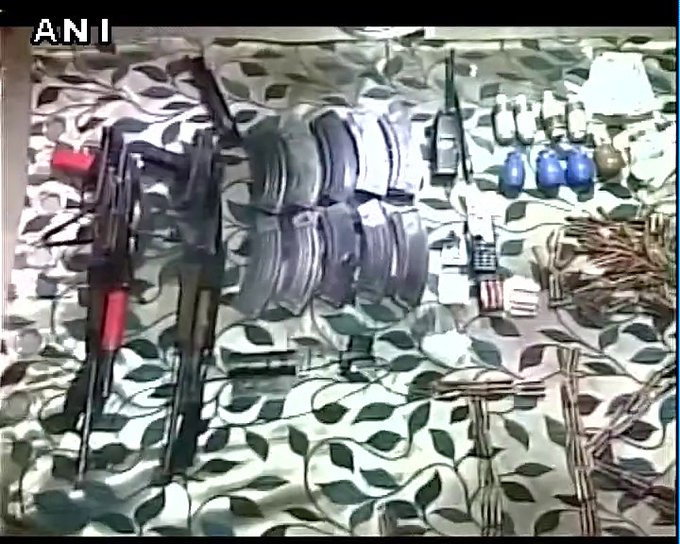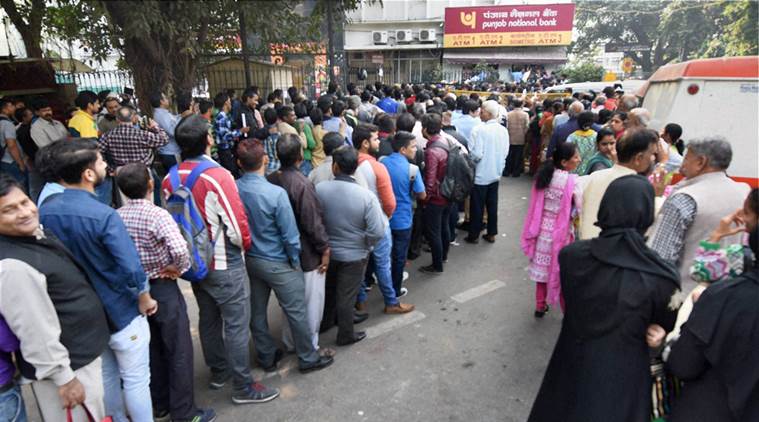GANESH65
Active member
J-K: Rs 2,000 notes recovered from terrorists killed in Bandipora
Over 290 incidents of firing and shelling along the LoC and the IB by Pakistani troops have been witnessed since Indian army conducted surgical strikes on terrorist launch pads in Pakistan-occupied Kashmir on September 29.
By: Express Web Desk | New Delhi | Updated: November 22, 2016 12:52 pm
 Jammu and Kashmir: Newly introduced Rs 2,000 notes along with ammuniton were recovered from two terrorists gunned down in Bandipora on Tuesday. (Source: ANI)The Army on Tuesday recovered Rs 2,000 notes, which have been in circulation for less than a fortnight, from two terrorists killed in Bandipora district of Jammu and Kashmir, news agency ANI reported. Security forces had cordoned off the area early morning after the terrorists who were holed up there opened fire. A heavy gunbattle ensued soon after. A combing operation was underway to flush out for more terrorists, if any, the agency further reported.rorists Killed In Bandipora, Combing Unde
Jammu and Kashmir: Newly introduced Rs 2,000 notes along with ammuniton were recovered from two terrorists gunned down in Bandipora on Tuesday. (Source: ANI)The Army on Tuesday recovered Rs 2,000 notes, which have been in circulation for less than a fortnight, from two terrorists killed in Bandipora district of Jammu and Kashmir, news agency ANI reported. Security forces had cordoned off the area early morning after the terrorists who were holed up there opened fire. A heavy gunbattle ensued soon after. A combing operation was underway to flush out for more terrorists, if any, the agency further reported.rorists Killed In Bandipora, Combing Unde
On November 8, Prime Minister Narendra Modi, while announcing the move to scrap old high currency tender, said counterfeit notes are being used to fund terrorist activities in the country. The recovery of the new notes from the terrorists will provide ammunition to the opposition which has been in a combative mood inside the Parliament.
New Rs 2000 notes recovered from terrorists gunned down by Army in Bandipora(J&K) today. pic.twitter.com/l9y1xqyoem
Arms & ammunition recovered by Army from terrorists gunned down in Bandipora (J&K) today pic.twitter.com/i1X9izIfhq
12:37 PM - 22 Nov 2016 · New Delhi, India

Meanwhile, a Pakistani intruder was killed in firing by Border Security Forces (BSF) along the International Border in RS Pura sector of Jammu district. According to reports, the intruder was challenged by troops and was shot when he did not pay heed. On Monday, a BSF head constable was killed and five others were injured when Pakistani troops resorted to heavy mortar shelling on forward Indian positions and civilian areas at separate places along the Line of Control in Jammu and Kashmir. Over 290 incidents of firing and shelling along the LoC and the International Border by Pakistani troops have been witnessed since Indian army conducted surgical strikes on terrorist launch pads in Pakistan-occupied Kashmir on September 29.
http://indianexpress.com/article/in...f-pakistan-intruder-surgical-strikes-4389037/
Over 290 incidents of firing and shelling along the LoC and the IB by Pakistani troops have been witnessed since Indian army conducted surgical strikes on terrorist launch pads in Pakistan-occupied Kashmir on September 29.
By: Express Web Desk | New Delhi | Updated: November 22, 2016 12:52 pm

On November 8, Prime Minister Narendra Modi, while announcing the move to scrap old high currency tender, said counterfeit notes are being used to fund terrorist activities in the country. The recovery of the new notes from the terrorists will provide ammunition to the opposition which has been in a combative mood inside the Parliament.
New Rs 2000 notes recovered from terrorists gunned down by Army in Bandipora(J&K) today. pic.twitter.com/l9y1xqyoem
Arms & ammunition recovered by Army from terrorists gunned down in Bandipora (J&K) today pic.twitter.com/i1X9izIfhq
12:37 PM - 22 Nov 2016 · New Delhi, India

Meanwhile, a Pakistani intruder was killed in firing by Border Security Forces (BSF) along the International Border in RS Pura sector of Jammu district. According to reports, the intruder was challenged by troops and was shot when he did not pay heed. On Monday, a BSF head constable was killed and five others were injured when Pakistani troops resorted to heavy mortar shelling on forward Indian positions and civilian areas at separate places along the Line of Control in Jammu and Kashmir. Over 290 incidents of firing and shelling along the LoC and the International Border by Pakistani troops have been witnessed since Indian army conducted surgical strikes on terrorist launch pads in Pakistan-occupied Kashmir on September 29.
http://indianexpress.com/article/in...f-pakistan-intruder-surgical-strikes-4389037/






